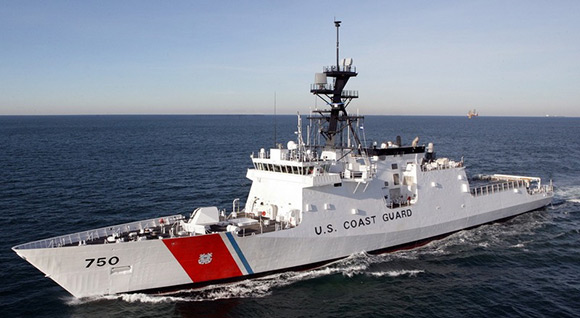Coast Guard Sets Port Condition ‘WHISKEY’ For South Florida Ports As ‘Erika’ Nears
By Space Coast Daily // August 28, 2015

FLORIDA – Effective 8:00 p.m. Thursday, Capt. Austin Gould, Coast Guard Captain of the Port (COTP), set port condition WHISKEY for Port Miami, Miami River, Port Everglades, Port of Palm Beach, Port of Ft. Pierce and all other South Florida terminals and facilities due to the expectation that sustained gale force winds generated by Tropical Storm Erika may arrive within 72 hours.
These ports and facilities are currently open to all commercial traffic and all transfer operations may continue while WHISKEY remains in effect. Sustained winds between 39 and 54 mph are possible within 72 hours.
Mariners are reminded that there are no safe havens in these facilities and that ports are safest when the inventory of vessels is at a minimum. All oceangoing commercial vessels and oceangoing barges greater than 500 gross tons should make plans for departing the port.
Vessels desiring to remain in port must immediately contact the Captain of the Port at 305-535-4472 to receive permission to do so, and are required to submit a safe mooring plan in writing.
Vessels bound for South Florida unable to depart 24 hours prior to threatening winds making landfall are advised to seek an alternate destination.
Pleasure craft are advised to seek safe harbor. Drawbridges may not be operating if sustained winds reach 25 mph or when an evacuation is in progress.
Port facilities are advised to review their heavy weather plans and take all necessary precautions to adequately prepare for the expected conditions.
Mariners can anticipate the Coast Guard setting port readiness condition X-RAY when sustained gale force winds from Tropical Storm Erika are within 48 hours of landfall.
“The dangers of inclement weather should never be taken lightly and I discourage anyone who may be thinking of taking to the sea over the weekend,” said Capt. Austin Gould, Coast Guard Captain of the Port.
“The most important thing is that everyone be safe, be smart, be ready.”
If and when port readiness condition YANKEE is set, meaning sustained gale force winds are expected within 24 hours, vessel movement shall be restricted and all movements must be approved by the Captain of the Port.
The Coast Guard is warning the public of these important safety messages:
-
Stay off the water. The Coast Guard’s search and rescue capabilities degrade as storm conditions strengthen. This means help could be delayed. That is why boaters should heed weather watches, warnings and small craft advisories.
-
Evacuate as necessary. If mandatory evacuations are set for an area, the public should evacuate without delay. Coast Guard personnel and other emergency responders may not be able to evacuate those in danger during the storm.
-
Secure belongings. Owners of large boats are urged to move their vessels to inland marinas where they will be less vulnerable to breaking free of their moorings or to sustaining damage. Trailerable boats should be pulled from the water and stored in a place that is not prone to flooding. Those who are leaving their boats in the water are reminded to secure life rings, lifejackets and small boats. These items, if not secured properly, can break free and require valuable search and rescue resources to be diverted to ensure they are not actually people in distress.
-
Stay clear of beaches. Wave heights and currents typically increase before a storm makes landfall. Even the best swimmers can fall victim to the strong waves and rip currents caused by hurricanes. Swimmers should stay clear of beaches until local lifeguards and law enforcement officials say the water is safe.
-
Be prepared. Area residents should be prepared by developing a family plan, creating a disaster supply kit, having a place to go, securing their home and having a plan for pets. Information can be found at the National Hurricane Center’s webpage.
-
Stay informed. The public should monitor the progress and strength of the storm through local television, radio and Internet. Boaters can monitor its progress on VHF radio channel 16. Information can also be obtained on small craft advisories and warnings on VHF radio channel 16.
For information on how to prepare your boat or trailer for a hurricane, please click here.













